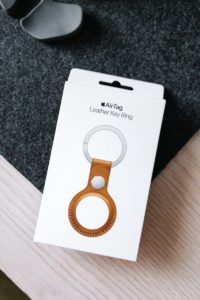 AirTags – introduced by Apple in April 2021 to help people track and find their important belongings – have found a multitude of uses since then. Tucked into your laptop bag in case you accidentally leave it in an Uber, attached to a pet’s collar in case they get out of the house, or placed under a floor mat in your car as an anti-theft tracking device, they can and have provided critical real-time positional data. They’ve also seen some controversy, as a tool that can be used by stalkers if placed on a person’s vehicle or in their belongings without their knowledge – which led to some changes in their design, including sounds and alerts if an AirTag you don’t own is moving with you.
AirTags – introduced by Apple in April 2021 to help people track and find their important belongings – have found a multitude of uses since then. Tucked into your laptop bag in case you accidentally leave it in an Uber, attached to a pet’s collar in case they get out of the house, or placed under a floor mat in your car as an anti-theft tracking device, they can and have provided critical real-time positional data. They’ve also seen some controversy, as a tool that can be used by stalkers if placed on a person’s vehicle or in their belongings without their knowledge – which led to some changes in their design, including sounds and alerts if an AirTag you don’t own is moving with you.
Airline passengers have also been making good use of AirTags since they were released – with an AirTag in your luggage, it’s easy to see if it made the flight with you, and can assist in recovery if a bag is lost or stolen. And, of course, many passengers found that they were getting more precise information than the airline about their lost luggage, sometimes directly contradicting the airline’s claims about the bag’s progress.
Unsurprisingly, that’s a social media nightmare for airlines. Search for the top posts on Twitter about luggage and AirTags, and you’ll find a multitude of posted receipts, comparing airlines’ stories to bags’ actual locations.
Though their decision is now reversed, one airline, Lufthansa, decided the solution to this problem was not to improve their baggage handling processes but to ban the AirTags from checked baggage. As they stated on Twitter:
“According to ICAO guidelines, baggage trackers are subject to the dangerous goods regulations. Furthermore, due to their transmission function, the trackers must be deactivated during the flight if they are in checked baggage and cannot be used as a result.”
These regulations were designed for much larger laptop batteries, not the lithium CR2023 battery used in AirTags. It’s the same battery used in common devices like battery-powered watches, and people fly with those all the time. In the US, neither the TSA nor the FAA has balked at the use of AirTags’ batteries or Bluetooth transmission in flight. Notably, no other airline globally moved to join Lufthansa in their position that ICAO guidelines for dangerous goods apply to AirTags.
I have friends who flew Lufthansa to Europe a few days before this edict was issued. Their bags lingered at their connecting airport and then in Germany for days, finally arriving in their hands a full five days after their flight landed. Without the AirTag, they would have been given no information on where the bags were – and they’re confident that the social media pressure they applied is the only thing that prioritized their case and got their bags into their hands at all.
From a public relations perspective, this has been a terrible move – it’s resulted in global bad press for Lufthansa and their reactionary decision, while also calling mainstream attention to a lost baggage problem that, while not contained to the Twittersphere prior to this, was at least not as widely covered by mainstream media. (Other airlines likely don’t appreciate Lufthansa bring attention to reports of lost baggage either, as Lufthansa is definitely not the only airline to ever be called out for losing baggage and providing information that contradicts with the owner’s AirTag.) And from a customer experience perspective, this in no way addressed any logistics issues that might exist with baggage handling or improved deliverability. Instead, it reduced customer recourse and left customers more vulnerable to baggage theft at airport carousels.
Unsurprisingly, Lufthansa backed away from the ban – now, we wait to see if any airline will step up and embrace this new data source. An innovative company, rather than taking a reactionary approach in a failed attempt to save face, would look for a way to incorporate customer-provided AirTag data into their complete logistics for tracking lost bags. Now, which airline is up for it?